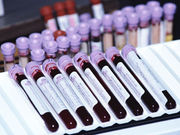High NLR linked to worse prognosis in Caucasian patients with early breast cancer
TUESDAY, March 8, 2016 (HealthDay News) — Presurgery high neutrophil to lymphocyte ratio (NLR) is a prognostic variable of worse outcome in Caucasian patients with early breast cancer, according to a study published online March 7 in ESMO Open: Cancer Horizons.
Michele Orditura, M.D., Ph.D., from the Second University of Naples School of Medicine in Italy, and colleagues conducted a retrospective analysis involving 300 Caucasian patients with early breast cancer. Patients were classified as having low or high NLR (134 and 166 patients, respectively), and the correlation with distant metastasis-free survival (DMFS) was measured.
The researchers found that for one, three, six, nine, 12, and 15 years, the DMFS rates were 100, 98.9, 91.7, 82.7, 82.7, and 82.7 percent, respectively, for the low NLR cohort and 99.4, 94.3, 84.5, 69.2, 66.0, and 51.4 percent, respectively, for the high NLR cohort, with a statistically significant association. On multivariate analysis, independent prognostic factors related to poor recurrence rate were premenopausal status (hazard ratio [HR], 2.78), N1 stage (HR, 2.31), and high NLR value (HR, 2.64). In propensity score-matched analysis, premenopausal status, N1 stage, and high NLR values were confirmed as independent prognostic variables of worse outcome (HRs, 2.94, 2.77, and 2.52, respectively).
“This is the first study, to our knowledge, to show a significant correlation between high NLR and worse prognosis in Caucasian patients with early breast cancer by means of propensity score-matched analysis,” the authors write.
Full Text (subscription or payment may be required)
Copyright © 2016 HealthDay. All rights reserved.








